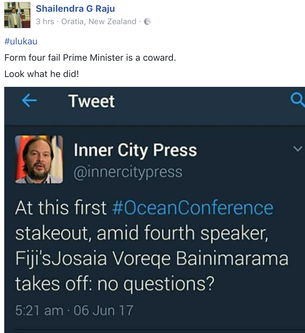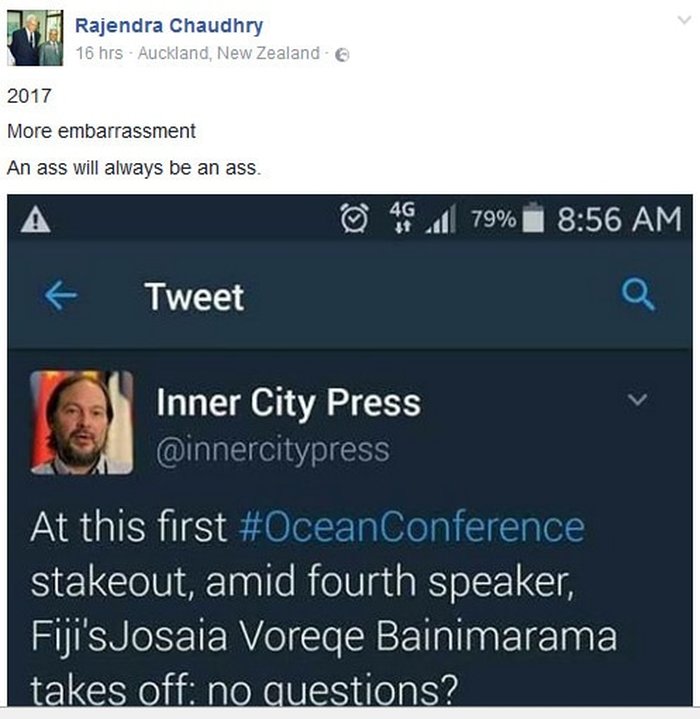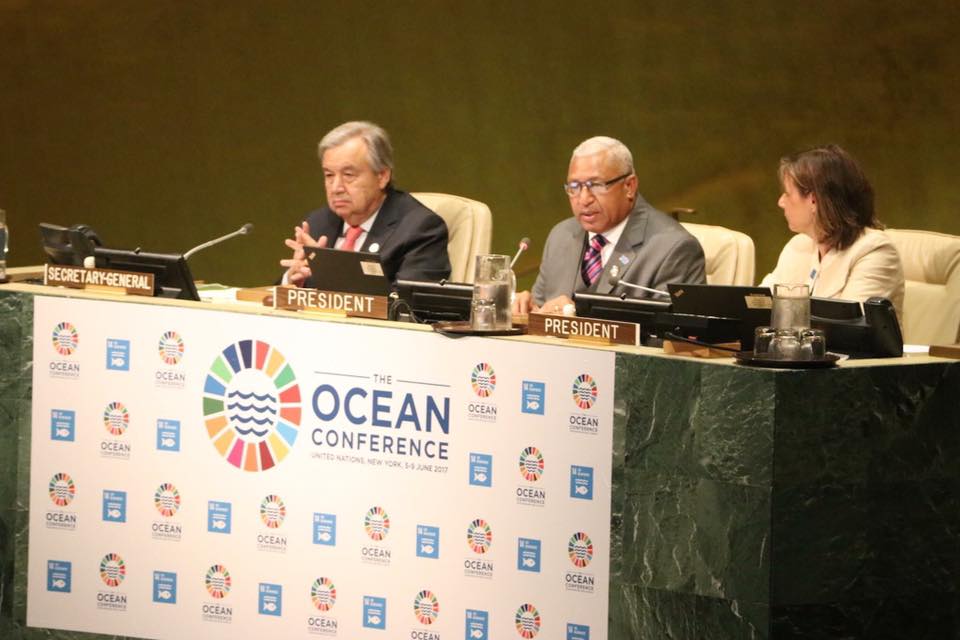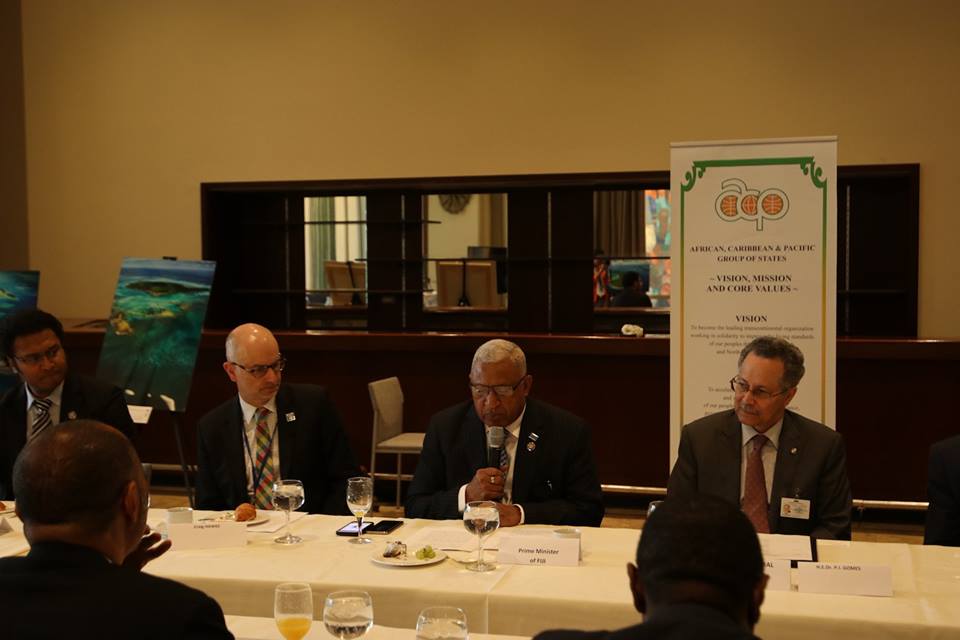Fijileaks has established that it had nothing to do with Prime Minister Frank Bainimarama "taking off". It was a UN decision not to take questions at the stakeout and the Swedish Deputy Prime Minister Isabella Lövin didn’t answer any either. She and Bainimarama just read prepared statements and were then ushered out. Fiji and Sweden are co-hosting the UN Ocean Conference. Bainimarama did an interview with the BBC the other day so he has been taking questions on oceans and COP
Mr. Chairman,
The Secretary General of the ACP Group of States, The Secretary General of UNCTAD,
Excellencies,
Ladies and Gentlemen.
1. Fiji very much values its membership of the ACP group of countries and I want to begin by expressing my sincere appreciation for the support you have all given us over the years. And especially the support you are giving Fiji in 2017 as we take on the dual but complimentary responsibilities of co-Chair of the Ocean Conference and incoming President of COP23. It is a critical imperative for all of us that we persuade the world to take urgent action on climate change and the deteriorating state of our seas and oceans. As I keep stressing, the two are inextricably linked. So I’m delighted to be able to participate in this important event - to share our experiences on “Unlocking the potential of the blue economy for the sustainable development of Small Island Developing States”. I would like to especially thank Dr. Gomes and his team for organising this meeting.
2. This dialogue on the margins of the Ocean Conference is extremely important for all of us. Never before has it been so critical to speak not just individually but as a bloc as we all focus on the implementation of SDG14. Because acting in concert - speaking with one voice - is the best way for ACP countries to mobilise the rest of the global community to join us in our determination to roll back the tide. To reverse the ever-spiraling decline in the quality and health of the seas and oceans on which so many of our people depend.
3. We all know what is at stake with the simultaneous threat we face. Whether it is the impact of climate change or continuing to degrade a precious resource at sea that has sustained successive generations and that we merely hold in trust for future generations. Simply put, our very survival is on the line. Our ability to sustain our people and ensure their security, not only from the elements - the extreme weather events that threaten our very existence - but our ability to feed ourselves. We cannot continue to have droughts and cyclones destroy our food security on land and continue to degrade an important source of nourishment in our oceans and seas. As well as the principal source of income for so many of our people, wherever we live in the world.
4. As I stressed in my opening statement yesterday, the time to act is now. We cannot afford to delay a decisive response to this crisis any longer. Excellencies, this week is the best chance we have had as a community of nations to develop a consensus on the best way forward. And it is also the best chance for the African, Caribbean and Pacific nations to put their best foot forward and be heard.
5. Individually and collectively, we all have a great story to tell. Because so many of us are bearing the brunt of this crisis - a crisis that affects the vulnerable nations most.
6. We also have a great story to tell about some of our own efforts to relieve the ever-growing pressures on our natural environments. Increasingly, ACP members are not only conscious of the need to act. They are already doing so. And I’m proud to say that Fiji is one of them. We do not believe that putting the health of our environment first in any way jeopardises our development. On the contrary, maintaining the pristine quality of our natural surroundings is front and centre of every development decision we make.
7. In Fiji, no development takes place until we can be sure that it is environmentally sustainable. There is sometimes a price to pay in terms of short-term financial gain. But it is a price that we are prepared to pay. Because the long-term benefit of responsible development that protects the environment far outweighs any short-term economic consideration.
8. We may be powerless to prevent the degradation of our seas and coastlines by other nations on the Pacific Rim who share our ocean but not our commitment. But when it comes to the areas that we do have control over, we are not prepared to compromise. And I repeat: no development on land or at sea in Fiji takes place if there is any risk to the environment. It is a central tenet of our Green Growth Framework and national development plans. And we are very proud to have drawn this responsible line in the sand.
9. Having said that, protecting the environment doesn’t mean sacrificing development. The key phrase is sustainable development. And embracing the ‘Blue Economy’ represents an opportunity to realise the great economic potential of the oceans as well as ensuring their long term sustainability.
10. As we pursue this goal, we very much appreciate the support of development partners like the EU, who recognise the challenges we face and are willing to assist us to strike the right balance. We in the Pacific certainly appreciate the fact that while the EU is the largest fisheries consumer in the world, it is siding with us in our effort to protect our long term interests. It is standing shoulder to shoulder with us in the fight against illegal, unreported, and unregulated fishing in the region, to maintain healthy fish stocks for future generations. And it is an example that we ask all nations to follow.
11. For Pacific Small Island Developing States, the stakes could not be higher. With the ocean making up almost 98 percent of our region’s area; with our cultures, heritage and traditions entwined with the ocean; and with its resources serving as a critical source of our food security, prosperity, and well-being, the ocean is central to our way of life.
12. While Pacific nations rightly identify ourselves as stewards of the ocean in our own part of the world, we cannot save our waters on our own. And nor can the nations of the Caribbean or coastal nations of Africa. A collective global effort is required. Which is why we look to the rest of the world this week to side with us in a decisive response to the challenges we face. Not only to protect our seas and oceans but in a decisive response to the impacts of climate change.
13. Excellencies, I have repeatedly made the point as incoming COP President that climate change and the state of our oceans are interlinked. They cannot be separated. Because much of the degradation of our seas and oceans is being caused by climate change.
14. I want to thank the ACP for its support for Fiji’s presidency of COP23 thus far, including a side event at the May subsidiary body meetings in Bonn, where our Climate Ambassador was one of the speakers. And we look forward to our continued collaboration all the way to COP23 in November and beyond.
Thank you Mr. Chairman.







